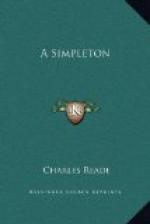In the drawer of his writing-table she found his diary. It was a thick quarto: it began with their marriage, and ended with his leaving home—for then he took another volume. This diary became her Bible; she studied it daily, till her tears hid his lines. The entries were very miscellaneous, very exact; it was a map of their married life. But what she studied most was his observations on her own character, so scientific, yet so kindly; and his scholar-like and wise reflections. The book was an unconscious picture of a great mind she had hitherto but glanced at: now she saw it all plain before her; saw it, understood it, adored it, mourned it. Such women are shallow, not for want of a head upon their shoulders, but of attention. They do not really study anything: they have been taught at their schools the bad art of skimming; but let their hearts compel their brains to think and think, the result is considerable. The deepest philosopher never fathomed a character more thoroughly than this poor child fathomed her philosopher, when she had read his journal ten or eleven times, and bedewed it with a thousand tears.
One passage almost cut her more intelligent heart in twain:—
“This dark day I have done a thing incredible. I have spoken with brutal harshness to the innocent creature I have sworn to protect. She had run in debt, through inexperience, and that unhappy timidity which makes women conceal an error till it ramifies, by concealment, into a fault; and I must storm and rave at her, till she actually fainted away. Brute! Ruffian! Monster! And she, how did she punish me, poor lamb? By soft and tender words—like a lady, as she is. Oh, my sweet Rosa, I wish you could know how you are avenged. Talk of the scourge—the cat! I would be thankful for two dozen lashes. Ah! there is no need, I think, to punish a man who has been cruel to a woman. Let him alone. He will punish himself more than you can, if he is really a man.”
From the date of that entry, this self-reproach and self-torture kept cropping up every now and then in the diary; and it appeared to have been not entirely without its influence in sending Staines to sea, though the main reason he gave was that his Rosa might have the comforts and luxuries she had enjoyed before she married him.
One day, while she was crying over this diary, Uncle Philip called; but not to comfort her, I promise you. He burst on her, irate, to take her to task. He had returned, learned Christopher’s departure, and settled the reason in his own mind: that uxorious fool was gone to sea by a natural reaction; his eyes were open to his wife at last, and he was sick of her folly; so he had fled to distant climes, as who would not, that could?
“So, ma’am,” said he, “my nephew is gone to sea, I find—all in a hurry. Pray may I ask what he has done that for?”
It was a very simple question, yet it did not elicit a very plain answer. She only stared at this abrupt inquisitor, and then cried, piteously, “Oh, Uncle Philip!” and burst out sobbing.




